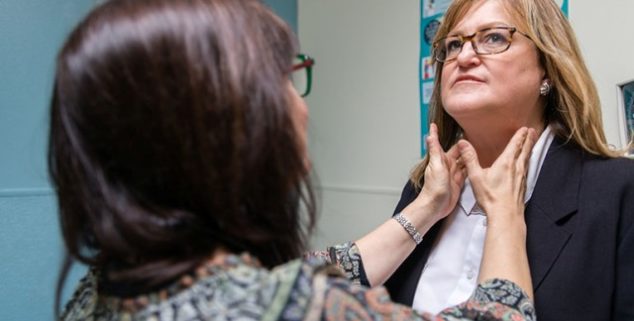News
Community health centers battle for funding
 Lisa Zeelander, a medical doctor at Valley Community Healthcare in North Hollywood, examines patient Pamela Richardson, 60, on Wednesday, Dec. 21, 2016. (Photo: Heidi de Marco/KHN)
Lisa Zeelander, a medical doctor at Valley Community Healthcare in North Hollywood, examines patient Pamela Richardson, 60, on Wednesday, Dec. 21, 2016. (Photo: Heidi de Marco/KHN)It’s been nearly two weeks since a crucial deadline passed to continue funding for community health centers, the nonprofit facilities that deliver care to the poor and uninsured in California and across the country.
Now, Congress is still squabbling over the details, advocates are still scrambling to get the funding renewed and the centers are starting to plan for the bottom line.
In California, the cut is estimated to reach more than $300 million, affecting nearly 300,000 patients, according to a report by the National Association of Community Health Centers (NACHC).
“Most health centers are sort of bunkering down,” said Andie Patterson, public affairs director for the California Primary Care Association. “Some health centers are trying to make crazy hard decisions at this point and others are just thinking about which staff they’ll have to lay off or will they scale back services?”
The Community Health Center Fund, which expired on Sept. 30, accounts for 70 percent of the federal grant funding that federally-qualified health centers receive. That’s a nationwide cut of $3.6 billion.
“Just because you have coverage, as we all have learned doesn’t mean you have access to a primary care provider.” — Andie Patterson
According to Amy Simmons Farber, a spokesperson for NACHC, at least one health center has already been denied for a loan, and many others are beginning to feel the effects of fiscal uncertainty.
“The reality is that health centers have begun tapping into their spending down reserves,” Simmons Farber added. “Each health center is probably making their own plan about how they’re going to cut back costs.”
According to an NACHC survey, more than a quarter of community health centers already reported difficulty recruiting new providers of health care. Patterson said this is especially troubling given the existing shortage of primary care providers.
“Just because you have coverage, as we all have learned doesn’t mean you have access to a primary care provider,” she said. “You want that access and that’s where the health center funding comes in.”
While health centers brace themselves for the worst, advocates, knowing that the Health Resources and Services Administration does not expect the full financial impact until the grants’ scheduled renewal in January, keep pushing for solutions.
“Advocating for reauthorization of funding every 1.5 years requires staff time and resources being diverted away from our core work of health center operations.” — Laura Sheckler
“Continuing with that sustained advocacy particularly in the face of Congress not acting, I think that can be disheartening,” said Laura Sheckler with the Community Clinic Consortium in Contra Costa County. “We’ve also had so many advocacy pushes with this administration already that I think advocacy fatigue is something that we currently face and will continue facing for at least the next number of years.”
To that end, advocates want five years of funding and for the CHCF to be packaged with the Children’s Health Insurance Plan (CHIP) reauthorization. Lumping both things together might not make a huge difference, however: both CHIP and funding for community health centers enjoy bipartisan support. And both failed to meet the renewal deadlines on Sept. 30.
On the length of the extension, advocates are also compromising: The current language in both the House and the Senate only grants two more years of funding, not five.
“As you can imagine, advocating for reauthorization of funding every 1.5 years requires staff time and resources being diverted away from our core work of health center operations,” Sheckler added in an email.
Patterson added that five years of funding is key to ensure that health centers have the stability necessary to thrive in the industry. Still, she said, two years is “better than nothing.”
—
Ed’s Note: Corrects funding-loss and patients-affected estimates in California to $300 million and 300,000, respectively, 3rd graf.
Want to see more stories like this? Sign up for The Roundup, the free daily newsletter about California politics from the editors of Capitol Weekly. Stay up to date on the news you need to know.
Sign up below, then look for a confirmation email in your inbox.

Leave a Reply